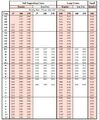Ceramics
Notes
- Fine Detail
- Strikingly precise
- wears away quickly - like in fewer than a dozen castings. (GPT says 30 - 50 castings)
- This supports the 3 step mold:
- 3D Print (costly, time consuming, high precision, master)
- Silicone or Urethane mold (cheaper, rubbery / durable)
- Plaster mold (good for 20 shots, cheap)
- You could hit a rhythm of creating a new plaster mold every day, with 20 active molds at a time and a 24 hour pull cycle.
- Porosity of the bisque is critical for underglaze adhesion.
- Fire on the low end of cone 06 - 04?
- Don't get the surface dirty.
Links
- https://old.reddit.com/r/Ceramics/
- Kiln_Controller
- Making Casting Slip: https://www.youtube.com/watch?v=9I3XE3D6Nqs
- Clay and Water to Thick Oatmeal (200 parts dry clay, 50 parts water, ballpark)
- Mix in 4 parts Sodium Silicate and 1 part soda ash until half-and-half consistency.
- The Competition: https://www.youtube.com/watch?v=2JWwIpmHLO8
- Production Moldmaking: https://www.youtube.com/watch?v=5rUq9m_mIW8
- Slip Chemistry : https://www.youtube.com/watch?v=dmj7XiOd1K4
- Color Inspiration: https://old.reddit.com/r/Ceramics/comments/19d754y/so_happy_with_my_most_recent_round_of_pieces_and/
- Motawi Tile: https://www.youtube.com/watch?v=lv4ITBL70nQ
- Pinstripe Underglaze: https://old.reddit.com/r/Ceramics/comments/19d754y/so_happy_with_my_most_recent_round_of_pieces_and/
- Slipcasted Bowls: https://old.reddit.com/r/Ceramics/comments/12zk9um/a_few_of_my_cute_slipcasted_bowls/
- This isn't a faux fountain: https://old.reddit.com/r/Ceramics/comments/16k9yjx/trinket_or_jewelry_dish_with_melted_glass/
- Laguna Kiln Furniture
- Marjon Supply: https://marjonceramics.com/
- Low, Mid, High: https://thepotterywheel.com/low-fire-vs-high-fire-clay/
- Finding a Firing Service: https://thepotterywheel.com/10-easy-ways-to-find-a-pottery-firing-service-near-me/
- Formulating Porcelain: https://www.digitalfire.com/article/formulating+a+porcelain
- Mechanics of Ceramics: https://www.youtube.com/watch?v=llxiBmKNZSI
- Flexural Strength: https://en.wikipedia.org/wiki/Flexural_strength
Recipes
Plaster
- 1 Liter of Mold
- 1 Kilo of Dry #1 Pottery Plaster
- 0.7 Liters (kilos) of Water
- slake 3 minutes
- stir
- For 5 minutes?
- until uniform, as little as possible?
Slip
- 1.75 specific gravity
- Have tried as low as 1.7, which I like. Update: maybe a bit too thin, though I do like the slight castings it produces.
- Have tried as high as 1.85, which is too thick for me.
- Seems to effect the thickness of the casting - more so than does the dwell time before pouring off.
- too much deflocculant = gels quickly
- Just right = gels eventually, like hours
- OK - never gels but very liquidy
- recipe 1
- 40 fl oz thick oatmeal clay
- 12 ml sodium silicate solution
- 1/4 tsp soda ash (dissolved in a tablespoon of water)
- barium carbonate to capture salts
- sodium ash to dissolve lignite (small)
- filter to remove large lignite

